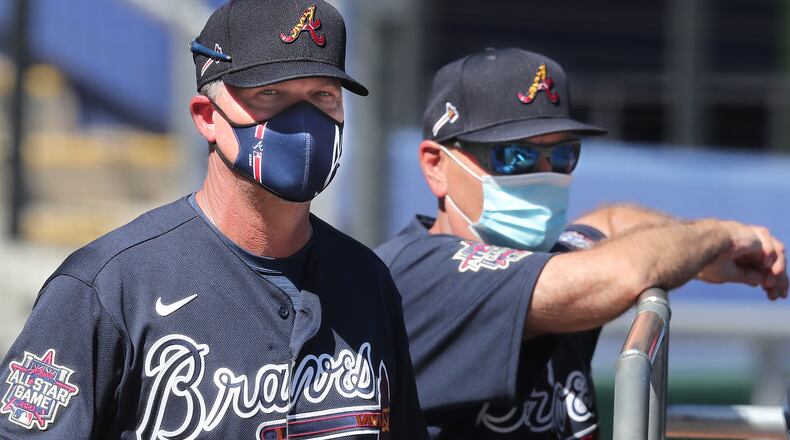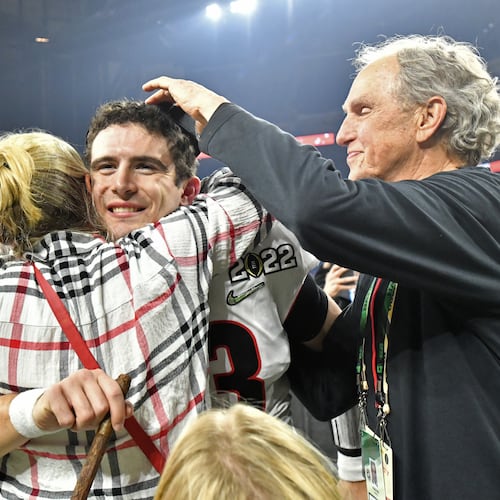Chipper Jones wasn’t watching in real time Saturday when things got real bad for the Braves: Their young star Ronald Acuna crashing to earth with a blown-up knee in Miami.
But all news — especially the unsettling kind — spreads like a flame through the dry tinder of social media. And it wasn’t long before Jones was messaging Braves GM Alex Anthopoulos with an offer to advise Acuna on what comes next.
Yes, please. For Jones is uniquely qualified to help and encourage here. He lived the same thing and came out the other side a Hall of Famer.
In fact, Jones was a year younger than the 23-year-old Acuna when his ACL popped as he twisted awkwardly trying to avoid a tag at first base during a spring training game in Fort Lauderdale, Fla., in 1994. And nowhere near as established as Acuna, at the time a 1990 No. 1 draft pick with all of four Major League plate appearances just playing his way onto the big club’s roster.
When Jones does get to Acuna, this is what he wants to say:
“The first thing I will tell him,” Jones relayed Sunday night, “I will point right at that quad (the mass of muscle in his thigh) and say, ‘Pay attention to that muscle right there.’ ”
And, after the practical rehab guidance, he’ll want to add: “ ‘You are going to be fine. Yes, it sucks that you’re going to miss a half of a year during the course of your career. I know you want to be out there for your teammates and your teammates want you out there. Hey, this is the reality. This is a speedbump. It’s not going to derail your career in any shape or form. It is a speedbump.’ ”
What better example could Acuna draw from as he goes from the teary-eyed shock of the ligament tear to the arduous, unseen task of rehab from surgery? And so convenient, too, with Jones, the lifetime Brave, already on hand as a hitting consultant.
What faces Acuna is not going to be easy. “Twelve hours after they replace his ACL, they’re going to bend his knee to a 90-degree angle. It’s going to be one of the most painful things that he ever does in his life. But they have to get that range of motion back,” Jones said.
It’s not for the faint of heart. “Whenever you have a big knee injury — I’m not going to call it catastrophic, but it’s every bit the Tommy John surgery of the knee — it’s important to keep your confidence,” Jones counseled.
It’s not going to be in any way familiar for a young player who has always had a charmed and special relationship with every movement on the ballfield. “The game has always come easy to him. He was touched by God to play this game. He’s unbelievable at it,” Jones said. “Now, he’s going to have to work to get his body back to where we all know that RAJ (as in Ronald Acuna Jr.) can be.”
But the bottom line, Jones said, is that for all the short-term pain this injury has caused Acuna and the Braves, it does not have to be an on-going obstacle. In fact, it could even serve him well in the future.
You could say it worked out OK for Jones after his surgery. He missed his chance to break in with the Braves in ’94 but came back the next season to play in 140 games, hit .265 and 23 home runs for a World Series-winning team. The first of 18 seasons over which he switch-hit for 468 homers and 2,726 hits. Cooperstown was suitably impressed.
And yes, he could still run a little bit afterward. In Jones’ MVP season of 1999, five years after the surgery, he stole 25 bases. But he doesn’t recommend damaging the same knee at the age of 38, as he did. That will really slow down a person. Although even following that, Jones played two more seasons.
He recognizes now that his first knee injury was a sort of well-disguised blessing. It forced Jones to begin working on a neglected part of body — his legs. Believing his swing was so much an upper-body experience, Jones before the injury had spent the majority of time working on his arms and shoulders.
“Now suddenly not only did I pay attention from my shoulders to my wrists, but I had to pay attention to my legs. I feel like it really helped me from a power and durability standpoint,” he said.
“It really propelled me, especially when I grew up and kind of got my man-strength, being able to synch my swing with my legs and drive the ball to the opposite field,” Jones said. “There’s no doubt that injury and that rehab contributed to that.”
Hence Jones’ inclination to fixate on Acuna’s quadriceps. Acuna will not lack for advice and motivational prodding. As Jones said, “If it’s up to me, if it’s up to anybody on the training staff, his family, I’m sure we’ll all going to be pushing him because he’s one of the most important players of our generation to come through this organization and we want to see him continue to develop and be the player we all know he can be.” And for his part, Jones is likely to harp on the importance of building up those legs, immediately.
There is an upwelling of optimism to Jones’ message. He comes bearing the belief that if Acuna gives his all to his rehab — and Jones has no reason to suspect he won’t — all the great promise of the last three-plus seasons can’t be denied.
“I’m telling you I would never wish an injury like this on anybody, but he could come back a bigger, better version of himself,” Jones said.
He goes on: “He hits balls as far as I’ve ever seen anybody hit ‘em. If he gets a big, strong lower half, he might be hitting balls 500 feet next year.
“There could be a little bit of something beneficial from this injury — at least that’s the way I choose to look at it.”
Precisely the type of aid and comfort so sorely needed now.
About the Author
The Latest
Featured



